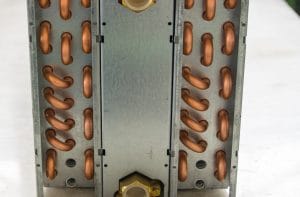 Heat pipes were among the first forms of heat exchangers to become popular, and they’ve remained the preferred solution for a wide range of applications. The popularity of modern heat pipes can be attributed to many different factors, from the eco-friendly way they transfer waste heat to the ease with which heat exchangers can be adapted for most applications’ thermal management needs. For many companies, the use of heat pipe heat exchangers for their electrical cooling needs creates a wide range of benefits. (more…)
Heat pipes were among the first forms of heat exchangers to become popular, and they’ve remained the preferred solution for a wide range of applications. The popularity of modern heat pipes can be attributed to many different factors, from the eco-friendly way they transfer waste heat to the ease with which heat exchangers can be adapted for most applications’ thermal management needs. For many companies, the use of heat pipe heat exchangers for their electrical cooling needs creates a wide range of benefits. (more…)
Why There Are So Many Benefits to Heat Exchangers
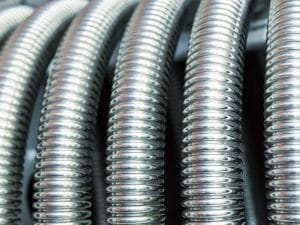 The many different benefits that come with using heat exchangers for electrical cooling are largely undeniable. By now, efficient, low-cost and low-maintenance electrical thermal management have become par for the course for many different applications. As more companies integrate heat exchanger technology into their processes and utilize more advanced, heat exchanger-cooled application, those benefits continue to become even more profound. Today, we take a look at just a few of the more important benefits that heat exchangers provide, and how companies in every industry continue to take advantage of them. (more…)
The many different benefits that come with using heat exchangers for electrical cooling are largely undeniable. By now, efficient, low-cost and low-maintenance electrical thermal management have become par for the course for many different applications. As more companies integrate heat exchanger technology into their processes and utilize more advanced, heat exchanger-cooled application, those benefits continue to become even more profound. Today, we take a look at just a few of the more important benefits that heat exchangers provide, and how companies in every industry continue to take advantage of them. (more…)
The Industrial Uses of Cold Plate Heat Exchangers
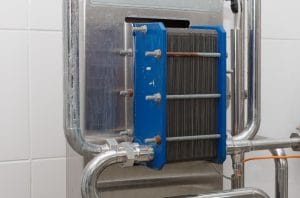 Since their initial introduction to manufacturing and other industrial applications, heat exchangers have become an almost de facto choice for improved electrical thermal management. To meet the increasingly more demanding needs of advanced technologies, heat exchangers have also evolved to include several different styles and iterations, including customized cooling solutions designed specifically for innovative, unique applications. For example, today, cold plate heat exchangers remain one of the more popular heat exchanger styles thanks to their high-performance cooling capabilities, high level of versatility, and much more. (more…)
Since their initial introduction to manufacturing and other industrial applications, heat exchangers have become an almost de facto choice for improved electrical thermal management. To meet the increasingly more demanding needs of advanced technologies, heat exchangers have also evolved to include several different styles and iterations, including customized cooling solutions designed specifically for innovative, unique applications. For example, today, cold plate heat exchangers remain one of the more popular heat exchanger styles thanks to their high-performance cooling capabilities, high level of versatility, and much more. (more…)
Thermal Management Challenges that Heat Exchangers Make Easy
 As heat exchangers have become integral to an increasingly wider range of applications, their capabilities have also expanded greatly. From safely and efficiently cooling common electrical enclosures to providing high-performance, specialized thermal management solutions for many industry-specific processes, heat exchangers are well-known for helping companies overcome many different common thermal management challenges. This has made them a significant advantage for companies in nearly every industry, and has made the electrical cooling challenges that companies face seem much less difficult to overcome. (more…)
As heat exchangers have become integral to an increasingly wider range of applications, their capabilities have also expanded greatly. From safely and efficiently cooling common electrical enclosures to providing high-performance, specialized thermal management solutions for many industry-specific processes, heat exchangers are well-known for helping companies overcome many different common thermal management challenges. This has made them a significant advantage for companies in nearly every industry, and has made the electrical cooling challenges that companies face seem much less difficult to overcome. (more…)
When Heat Exchangers Are Used in Hazardous Locations
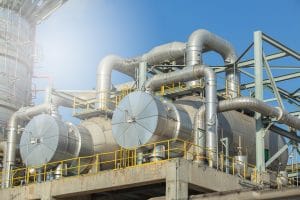 Heat exchangers have long been recognized for the benefits they bring to manufacturing and other industries. Their ability to streamline electrical cooling has been the source of significantly reduced costs and improved efficiency in many different areas. However, the benefits that heat exchangers provide are much more pronounced in some industries than they are in others. For example, companies that operate in hazardous locations, such as the oil and gas industry, rely on thermal management solutions for more than just efficiency. The cooling units they employ must also meet strict safety standards in order to be durable and effective enough to serve their purpose. (more…)
Heat exchangers have long been recognized for the benefits they bring to manufacturing and other industries. Their ability to streamline electrical cooling has been the source of significantly reduced costs and improved efficiency in many different areas. However, the benefits that heat exchangers provide are much more pronounced in some industries than they are in others. For example, companies that operate in hazardous locations, such as the oil and gas industry, rely on thermal management solutions for more than just efficiency. The cooling units they employ must also meet strict safety standards in order to be durable and effective enough to serve their purpose. (more…)
The Benefits Heat Exchangers Bring to Manufacturing
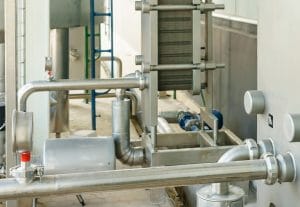 Today, heat exchangers are a common and often essential part of electrical thermal management within a wide range of industries. That’s because heat exchangers have long been recognized as one of the most efficient electrical cooling solutions, and every industry relies on technology to varying degrees. However, before they became such a widely implemented solution, heat exchangers first became popular as a way for manufacturing companies to efficiently cool increasingly larger-scale machinery and equipment. Even today, manufacturing companies rely heavily on modern, often customized heat exchangers for an increasingly wider range of applications. (more…)
Today, heat exchangers are a common and often essential part of electrical thermal management within a wide range of industries. That’s because heat exchangers have long been recognized as one of the most efficient electrical cooling solutions, and every industry relies on technology to varying degrees. However, before they became such a widely implemented solution, heat exchangers first became popular as a way for manufacturing companies to efficiently cool increasingly larger-scale machinery and equipment. Even today, manufacturing companies rely heavily on modern, often customized heat exchangers for an increasingly wider range of applications. (more…)
A Few Things Heat Exchangers Help Companies Save
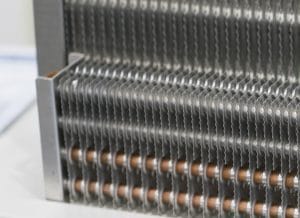 One of the principle reasons why companies choose to switch their electrical thermal management systems over to heat exchangers is to save costs, particularly those associated with energy usage. Traditionally, the solutions used to keep electrical control panels and other enclosures cool involved equipment such as air conditioners or air compressors, which often required large amounts of energy to power continuously. One of the first and most important advantages of heat exchangers was their ability to provide the same level of thermal management with just a fraction of the energy. Today, lower energy costs are still an important advantage, though modern heat exchangers help companies save much more as they become increasingly more popular. (more…)
One of the principle reasons why companies choose to switch their electrical thermal management systems over to heat exchangers is to save costs, particularly those associated with energy usage. Traditionally, the solutions used to keep electrical control panels and other enclosures cool involved equipment such as air conditioners or air compressors, which often required large amounts of energy to power continuously. One of the first and most important advantages of heat exchangers was their ability to provide the same level of thermal management with just a fraction of the energy. Today, lower energy costs are still an important advantage, though modern heat exchangers help companies save much more as they become increasingly more popular. (more…)
Everyday Impacts of the Use of Heat Exchangers
 Many of the most common benefits that companies experience from heat exchangers affect their own internal operations. For example, heat exchangers use less energy than other electrical cooling solutions, which means companies can automatically lower one of their highest overhead costs. They’re also more reliable, with more streamlined equipment that doesn’t require maintenance as frequently. However, many of the advantages of heat exchanger technology go beyond a company’s operations. Thanks to the advanced thermal solutions’ ability to optimize greener and more efficient cooling processes, heat exchangers also help reduce environmental footprints, create safer food & beverage handling processes, boost the safety and efficiency of advanced electronics, and more. (more…)
Many of the most common benefits that companies experience from heat exchangers affect their own internal operations. For example, heat exchangers use less energy than other electrical cooling solutions, which means companies can automatically lower one of their highest overhead costs. They’re also more reliable, with more streamlined equipment that doesn’t require maintenance as frequently. However, many of the advantages of heat exchanger technology go beyond a company’s operations. Thanks to the advanced thermal solutions’ ability to optimize greener and more efficient cooling processes, heat exchangers also help reduce environmental footprints, create safer food & beverage handling processes, boost the safety and efficiency of advanced electronics, and more. (more…)
Heat Exchangers and the Growth of Green Thermal Management
 For newer companies, the need to create processes and products in an environmentally responsible manner is an important consideration from the start. However, more established companies that have been operating for decades may remember when green energy efforts were largely unheard of. In every industry, the push for greener and more responsible operations has grown increasingly stronger over the years, and the companies that have remained competitive are those that have responded to that demand. In many cases, that includes reinventing their electrical cooling systems to create greener and more energy efficient means for keeping technology cooled. (more…)
For newer companies, the need to create processes and products in an environmentally responsible manner is an important consideration from the start. However, more established companies that have been operating for decades may remember when green energy efforts were largely unheard of. In every industry, the push for greener and more responsible operations has grown increasingly stronger over the years, and the companies that have remained competitive are those that have responded to that demand. In many cases, that includes reinventing their electrical cooling systems to create greener and more energy efficient means for keeping technology cooled. (more…)
Letting Heat Exchangers Handle Waste Heat Is More Efficient
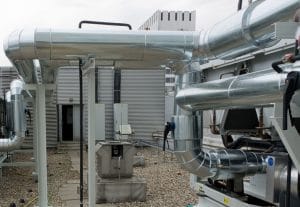 Technology designers and the companies that utilize their innovations have a number of different options when choosing the right electrical thermal management solution. In many cases, heat exchangers offer the most efficient and beneficial choice for a number of different reasons. Most of those reasons stem from the fact that, unlike traditional electrical cooling solutions, heat exchangers handle electrical waste heat by transferring it somewhere safely, rather than eliminating it with cold air. By letting heat exchangers handle the waste heat that their technological solutions produce, companies have been able to boost the efficiency of those solutions in several important ways. (more…)
Technology designers and the companies that utilize their innovations have a number of different options when choosing the right electrical thermal management solution. In many cases, heat exchangers offer the most efficient and beneficial choice for a number of different reasons. Most of those reasons stem from the fact that, unlike traditional electrical cooling solutions, heat exchangers handle electrical waste heat by transferring it somewhere safely, rather than eliminating it with cold air. By letting heat exchangers handle the waste heat that their technological solutions produce, companies have been able to boost the efficiency of those solutions in several important ways. (more…)







